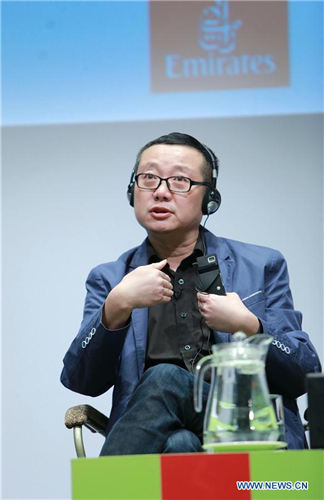Science fiction broadens horizons, says Liu Cixin
Xinhua | Updated: 2019-03-15 07:15

Liu Cixin, the author of Chinese best-selling science-fiction trilogy The Three-Body Problem, says that science fiction "opens our minds to everything that we might see in the future".
Liu was in Dubai recently to participate in a meeting with readers in the Emirates Airline Festival of Literature.
Liu says that science fiction makes readers interested in science, especially young people, which broadens their horizons as well as promotes their imagination and creativity.
Young readers should read various kinds of literature in order to find what they are truly interested in, he adds.
Liu says that he has read the works of Leo Tolstoy and Arthur Charles Clarke among others. "Reading all those books made me what I am today."
To gain international influence and recognition, Chinese science fiction should give readers new experiences, Liu says.
The trilogy The Three-Body Problem, which made Liu the first Asian writer to win the Hugo Award in 2015, has been translated into almost 20 languages.
"I hope that there will be an Arabic edition of The Three-Body Problem soon," Liu says.
Speaking about the recent Chinese sci-fi hit film The Wandering Earth, which is based on a novella of the same name by Liu, he says its success is mainly the result of diligent work by the movie team.
In Liu's view, the movie still lags behind Hollywood sci-fi movies in terms of technology and quality.
"As the first Chinese sci-fi movie, I should say that it's very exciting and encouraging. I saw a lot of progress in the special effects," Liu says.
Liu also says that though The Wandering Earth has earned success, it is impossible for Chinese scifi movies to ape those with big investments. He expects Chinese sci-fi movies to be more diverse.
"For now, we lack a complete ecosystem for sci-fi movies ... We also lack experts in special effects and screenwriters," he adds.
Liu says that sci-fi movies have a bright future especially in China where such movies will likely flourish.
However, he thinks the future for science fiction is gloomy. And he says the reasons are complicated as the reality is that the number of readers and writers are decreasing and there is a lack of influential sci-fi books as well.
"Science fiction has all kinds of possibilities. But as for which possibilities will become reality, it can not be predicted by sci-fi writers," he says.
























